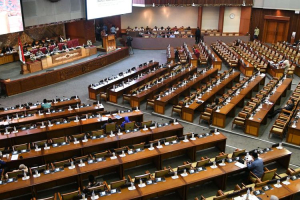Indonesia, EU, IOM launch Risk Index data tool on climate-induced displacement
The Indonesian government, the European Union, and the International Organization for Migration (IOM) have launched Risk Index for Climate Displacement (RICD), a data tool designed to provide operational foresight to anticipate, reduce, and respond to climate-induced displacement.
This initiative brings together multiple stakeholders, including the National Disaster Mitigation Agency (BNPB) and leading research institutions, such as the University of Indonesia (UI) and the National Research and Innovation Agency (BRIN), in a collaborative effort to tackle these challenges. By using a co-creation methodology, the RICD harnesses diverse expertise to build a comprehensive data model aimed at improving Indonesia's capacity to predict, mitigate, and respond to displacement risks driven by climate change.
“All partners contribute their expertise in a collaborative effort to develop comprehensive solutions to climate-induced displacement. This collective engagement is essential to strengthening our ability to anticipate, mitigate, and respond effectively to these challenges, ultimately reducing the impact on vulnerable populations,” Jeffrey Labovitz, Chief of Mission, IOM Indonesia said in a statement on Thursday, October 17, 2024.
In 2023, Asia and the Pacific witnessed 12.6 million internal displacements caused by disasters, representing 41 percent of the global total. Projections suggest that by 2050, up to 48.4 million people in East Asia and the Pacific could be displaced due to slow-onset hazards, many of which are linked to environmental changes. In the face of these growing trends, reliable data and evidence are crucial for minimizing displacement and associated risks. The Risk Index will support informed policy decisions and will guide operational responses to enhance resilience and protect vulnerable communities.
“By harnessing collective expertise, this project will strengthen our ability to predict and reduce displacement risks, ensuring that communities in Indonesia are better prepared and protected in the face of climate change,” Janez Lenarčič, European Commissioner for Crisis Management, said.
How RICD operates
The RICD operates at two key levels to provide a comprehensive understanding of displacement dynamics. It examines the drivers of displacement, including underlying factors such as economic, political, cultural, and demographic conditions that create the conditions for climate-related migration.
It also focuses on triggers of displacement − the immediate catalysts that force people to leave their homes, such as loss of livelihoods, food or water insecurity, or the loss of habitable land.
Notably, the index also identifies tipping points, which are critical thresholds where the cumulative impacts of climate change become severe enough to significantly increase the likelihood of displacement.
“This initiative is crucial for Indonesia, aligning with our national priorities in disaster preparedness, risk reduction and climate resilience. The Risk Index for Climate Displacement will provide data and insights needed to better anticipate and respond to climate-induced displacement, strengthening our preparedness and protecting vulnerable communities,” Abdul Muhari, Head of Data, Information and Communication Center at BNPB, said.
In the next few months, project partners will work together to develop the data model, beginning with a national-level macro analysis of displacement risks. This collaborative effort will then move to conducting micro-level assessments in key locations, providing targeted insights to inform policy and operational responses across Indonesia.
Already have an account? Sign In
-
Start reading
Freemium
-
Monthly Subscription
20% OFF$29.75
$37.19/MonthCancel anytime
This offer is open to all new subscribers!
Subscribe now -
Yearly Subscription
33% OFF$228.13
$340.5/YearCancel anytime
This offer is open to all new subscribers!
Subscribe now







